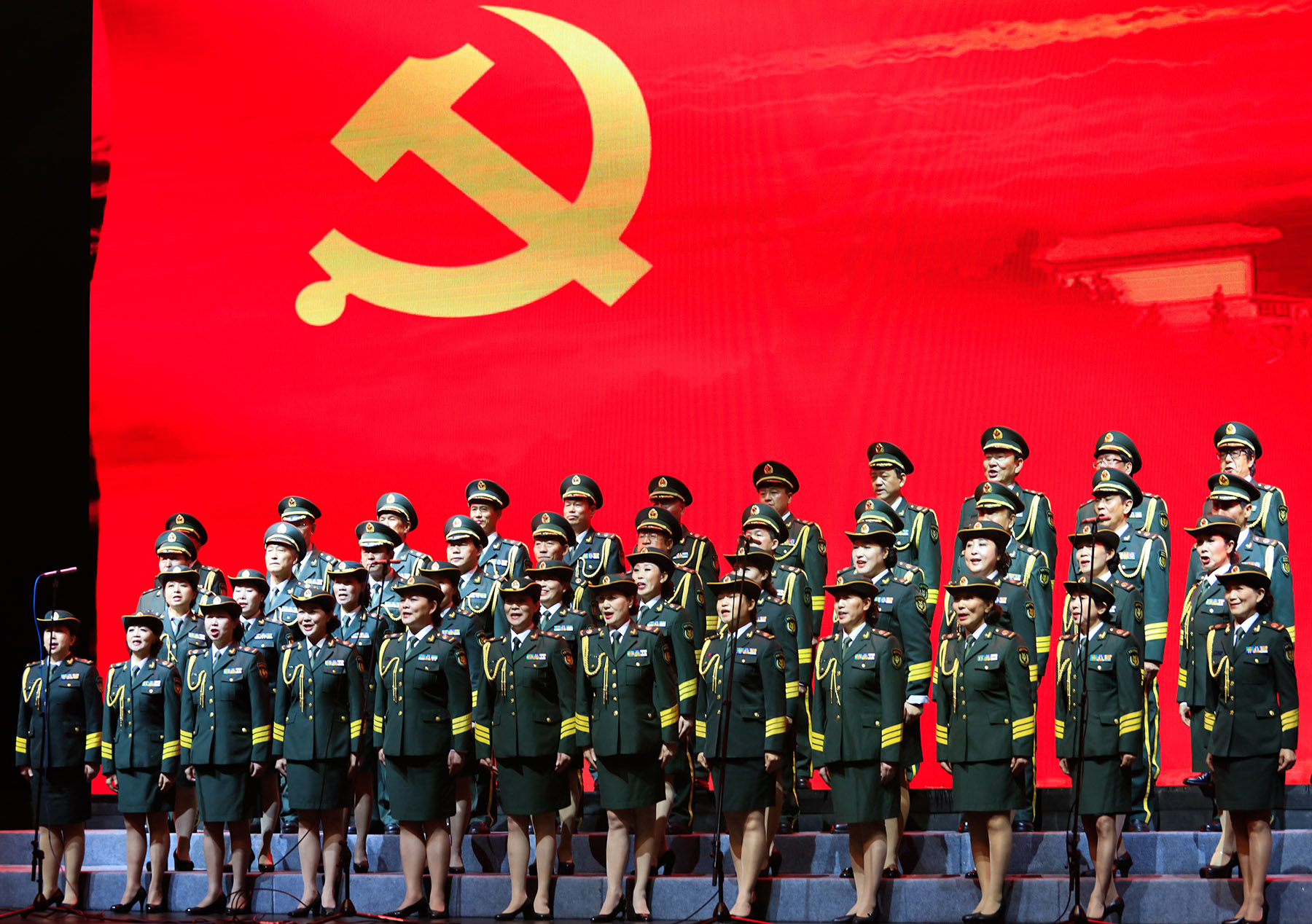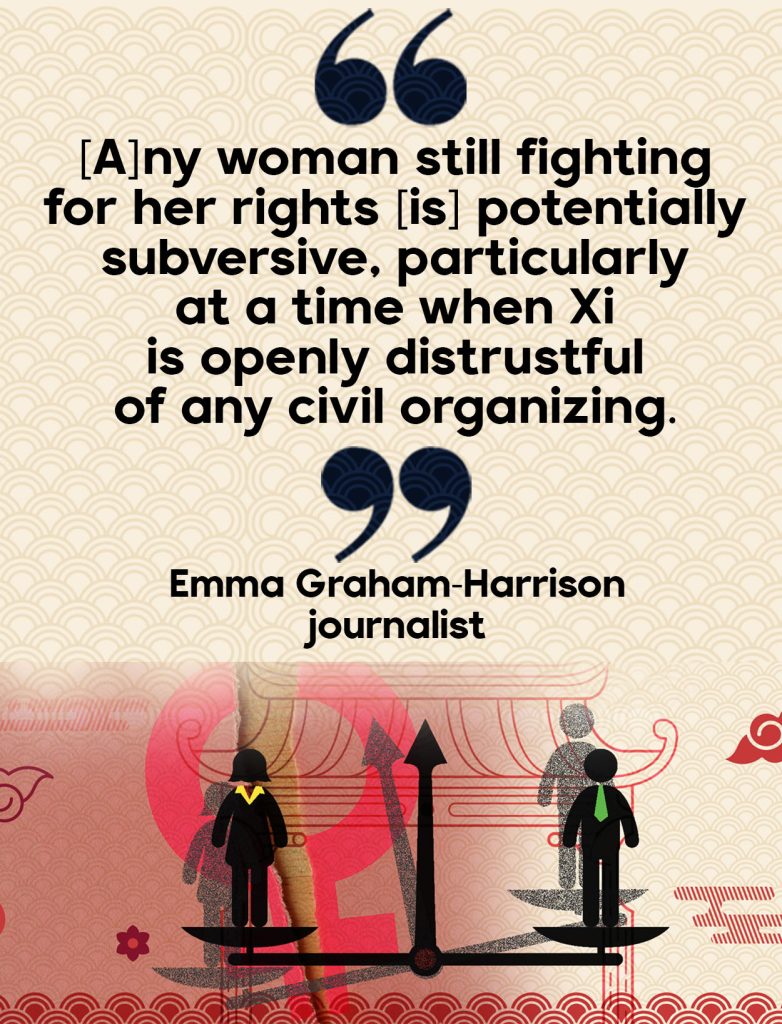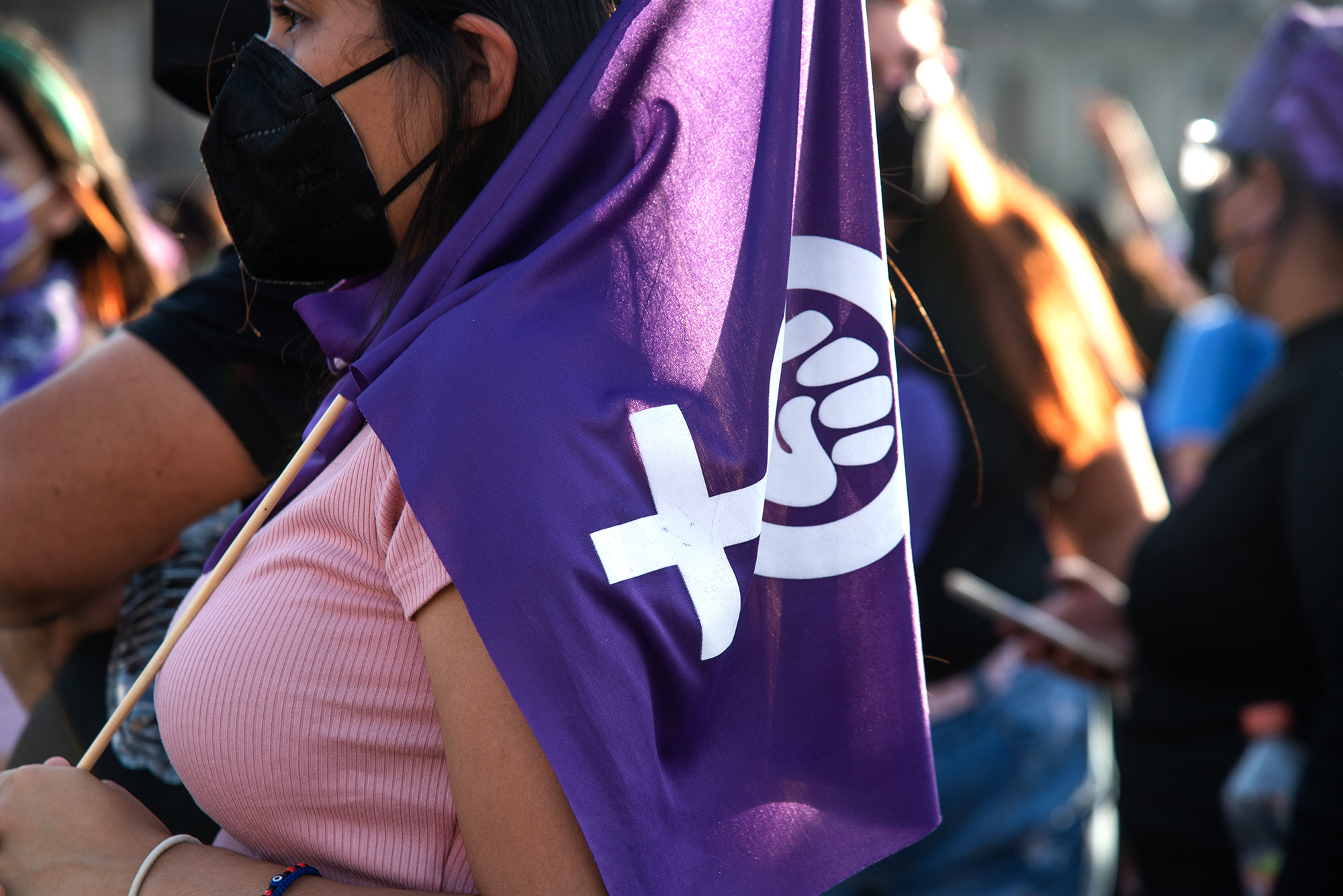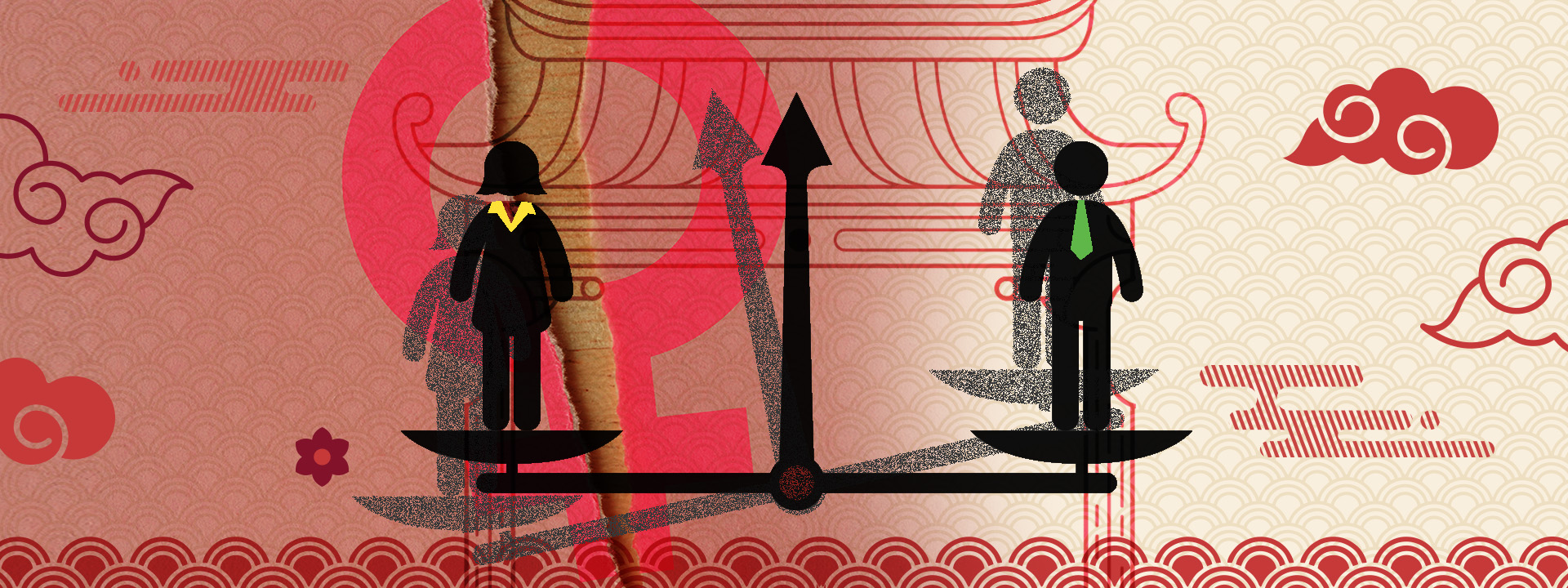|
Getting your Trinity Audio player ready...
|
S
he was then a graduate teaching assistant at a prestigious university in Beijing, and she thought she had the perfect topic for a discussion on contemporary feminist movements in China: the ‘Feminist Five,’ a group of women activists who had planned to protest against sexual harassment on public transports on International Women’s Day three years earlier, in 2015, in the Chinese capital. The women were later arrested in different cities.
But the academic, who asks to be referred to as ‘Guo’ for this report, says that the main lecturer of the course told her in private to reconsider her plan. According to Guo, the professor – who she describes as very experienced, daring, open-minded, and considerate – explained that “it would be better to evade the topic in a classroom setting, since it is extremely sensitive.”

Guo followed her professor’s advice. She says that she fully understands the professor’s hesitation to broach the topic in class, even if there would be only 15 students, mostly non-Chinese, participating in the discussion.
“It is better to be safe than to be sorry,” says Guo. “Our classrooms might be monitored.”
Chinese mass media had actually been completely silent on the detention of the quintet on the grounds of “picking quarrels and provoking trouble,” which caused massive backlash overseas. The incident had happened ahead of Chinese President and Chinese Communist Party (CCP) chief Xi Jinping’s co-hosting of the UN summit on women’s rights in New York. The summit itself was part of celebrations commemorating the 20th anniversary of Beijing’s 4th World Conference on Women, a watershed event in 1995.
The founder of the People’s Republic of China, Mao Zedong, was known for championing women’s power; the quote “Women hold up half the sky” is attributed to him. Although it was once known for the practice of footbinding for women and polygamy, China was one of the earliest signatories to the Convention on the Elimination of All Forms of Discrimination against Women” (CEDAW) in 1989. Six years later, the Beijing Declaration and Platform for Action (BDPA) was adopted by 189 countries. And under President Xi, China donated US$10 million to UN Women for BDPA’s implementation and the realization of Agenda 2030.
Since 1954, the Chinese state has safeguarded male-versus-female equality in the Chinese Constitution. The country also has a law on the protection of women’s rights and interests.

And yet, there are few women in high political positions in China. There has never been a female member of the Politburo Standing Committee. These days, no female can be found in the 24-member Politburo either. The highest political post a woman has ever held in modern China is that of vice premier. In the past 10 years, two women have held the position, with the latest, Sun Chunlan, stepping down just this March.
Meanwhile, a Chinese founder of a local feminist organization that raises awareness of gender issues says, “We feel that we are walking on the edges of what is allowed and what we might not be allowed to do.”
“Not black and white”
Indeed, for all Beijing’s support for women’s rights on the world stage, civil society groups and individual activists working on gender-related issues in China continue to face state surveillance and harassment.
Most know better than to push too far. Requesting that she be called by the pseudonym ‘Alicia,’ the feminist organization founder says that her team members have been approached by the police several times, even as she stresses that the police were neither coercive nor aggressive.She also admits that her team has practised self-censorship for safety reasons, as they have been aware of situations of self-identified feminist groups, communities, and organizations that have been shut down for big and bold work.
An October 2022 piece in the Guardian offers this explanation for China’s seemingly confusing stance on gender rights: “The CCP has always had an uneasy relationship with feminists, in part because Communists claim to have liberated women themselves. Mao’s slogan ‘women hold up half the sky’ became famous as half-tribute, half-promise to China’s women.”
“That makes any woman still fighting for her rights potentially subversive,” writes Guardian journalist Emma Graham-Harrison, “particularly at a time when Xi is openly distrustful of any civil organizing.”
Alicia, who identifies herself as a member of LGBT+, prefers to put it this way, though: “The situation is nuanced, complex. It is not black and white. It is not that the government does not care about gender equality. They do, but they want it to happen in their own way, not in the Western way.”

With a predominantly male leadership, however, that has meant following a mindset that is still decidedly patriarchal and places women in “traditional” roles. The “Five Good Family Campaign” that was introduced in 1956, for instance, was to partly acknowledge women’s efforts in areas such as education, managing the household, establishing connections with neighbors, keeping the house clean, and self-improvement.
The All-China Women’s Federation (ACWF), which represents China in gender-related events overseas, had also had to alter its agenda in 1957 in order to avoid being accused of having a bourgeois feminist mindset. Feminism at the time was suspected as “foreign” and rejected because it was inappropriate (non-Chinese) and inessential (women were already equal to men in communist China). For all its efforts, ACWF activities came to near standstill for decades.
State comes first
Wang Zheng, Professor Emerita of History and Women’s and Gender Studies at the University of Michigan, was the first author to dissect the “significant twist” of state feminism in the Chinese context in her 2005 article “State feminism? Gender and socialist state formation under Maoist China.”
A pioneer in feminist scholarship in China, Wang says that while most Western state feminism came into being on the heels of thriving autonomous women movements, Chinese feminist engagement with the state was unique. Hailing from the early feminist discourse led principally by male elites fascinated by Western advancement in the early 20th century and inspired by the Marxist ideology of class struggle linking women’s liberation, feminist thoughts and actions gained ground in China in the 1940s, with the patronage of the Communist Party, Wang points out. Not surprisingly, China’s gender-equality mechanism is more reactive to the state’s needs than responsive to demands of women, as well as of gender minorities.
China was isolated from global feminism both in principle and in practice through the ‘60s and most of the ‘70s. Not until 1978, when Deng Xiaoping embarked on opening up the country following Mao’s death did the ACWF become revitalized. But that has not made the government’s stand on many issues related to women and gender minorities any clearer, at least from the rights advocates’ perspective.
Alicia’s group, for example, is selective about what it says and what topics to engage with. It has even chosen to avoid certain topics, especially sexual harassment, because, Alicia says, “there is little definition of sexual harassment in China.”(Interestingly, Guo’s professor had also warned her not to discuss the story of Peng Shuai, the top-ranked Chinese tennis player who accused former Vice Premier Zhang Gaoli of sexual assault in 2018 and then dropped out from public view in 2021 in what was suspected to be a “forced disappearance.”)

“We just do not want to come up with our own definition and discussion,” says Alicia, explaining why they steer clear of discussing sexual harassment. “It could lead to some official attention. We have been trying to adhere to the official voices on this: shift the focus on women’s individual development, something between sociological understanding and psychological healing.”
The government’s stance regarding the LGBTQ+ community comes across as rather nebulous as well.
Overall, media representation has become more and more positive in the last several years. China has also decriminalized LGBT+. Yet, it has yet to act on calls to legalize same-sex marriages. It prohibits games and novels with gay or “boy-love” content. More recently, government regulators banned the appearance of so-called effeminate male celebrities on both television and video-streaming sites to enforce official morality and revolutionary culture, which does not include diverse expressions of masculinity.
Still, Troy Tsai, a Chinese scholar based in the United States, asserts that it is unfair to call the Chinese state homophobic or anti-queer.
“It’s when the claims for rights are put on the table that censorship and repercussions happen,” Tsai says. “But this is not a targeted action taken against the queers. Same applies to any population or marginalized groups. It’d be a misunderstanding to say that the state is targeting certain populations or ways of life….Going on the streets or hosting large-scale events funded by foreign embassies, for example, would be a risk to be contained, regardless of the theme or topic at stake.”
But he also says, “What is at stake here is the stability of society and legitimacy of the regime. Asking for rights is against neither.”◉



















